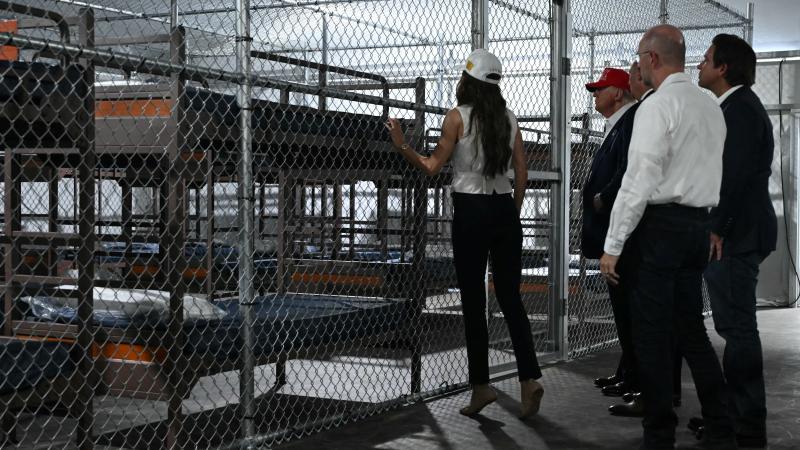CBS faces bipartisan backlash after '60 Minutes' aired selectively edited footage of DeSantis
"60 Minutes" condensed Florida governor's lengthy "pay-to-play" rebuttal down to several seconds.
CBS is facing bipartisan backlash after using heavily edited footage of Florida Gov. Ron DeSantis in a"60 Minutes" story alleging potential political corruption on the part of the Republican politician.
"60 Minutes" reporter Sharyn Alfonsi alleged in a recent report for the long-running news magazine that wealthy residents of Florida "cut the line during [the state's] frenzied vaccine rollout." In the segment, Alfonsi suggested that the state government's recent decision to award a vaccine distribution contract to the grocery chain Publix had the appearance of potential favoritism.
Citing public financial records, Alfonsi noted that "weeks before the governor's announcement, Publix donated $100,000 to his political action committee, Friends of Ron DeSantis." As part of the report, Alfonsi questioned DeSantis at a late March press conference about the arrangement, suggesting the governor had engaged in "pay-to-play" with the grocery chain.
The report presented DeSantis as having given about a 30-second response in which the governor gave a brief, hasty explanation of the deal and then spent a significant amount of time criticizing Alfonsi herself.
Yet full footage of the press conference showed that in responding to Alfonsi's query, the governor actually spoke for just over two minutes. In his response, DeSantis said that among the retailers to which the state reached out Publix was "the first one to raise their hands." A subsequent trial run with Publix went well, he said, leading the state to expand the program.
DeSantis also argued that there was a significant practical component to the decision to use Publix. Some public officials he spoke to, he said, "calculated that 90% of their seniors live within a mile and a half of a Publix." The state, he said, plans to use other retailers in the near future.
State Democrats slam 'intentionally false' reporting
DeSantis himself subsequently slammed the report, claiming it was "selectively edited" and was "done with malicious intent and a reckless disregard for the truth."
The governor's language was likely carefully chosen: Establishing "reckless disregard for the truth" is a key aspect of defamation law, with plaintiffs usually having to prove that element to win a libel suit.
Whether or not DeSantis will mount such an effort remains unclear. Yet in the days since its report, CBS has been broadly criticized not just by conservatives but by a bipartisan chorus including some Florida Democrats.
Jared Moskowitz, a Democratic politician in the state and the head of Florida's Division of Emergency Management, last week slammed the insinuations from the news outlet that the choice of Publix had been untoward.
"I said this before and I'll say it again," he wrote on Twitter. "[Publix] was recommended by [Emergency Management] and [the Florida Department of Health] as the other pharmacies were not ready to start. Period! Full Stop!"
"No one from the Governors office suggested Publix," he added. "It's just absolute malarkey."
A Monday statement from Palm Beach County's Democratic Mayor Dave Kerner, meanwhile, echoed DeSantis's allegation that the "60 Minutes" segment was deliberately misleading.
"The reporting was not just based on bad information — it was intentionally false," he wrote. "I know this because I offered to provide my insight into Palm Beach County's vaccination efforts and 60 minutes [sic] declined. They know that the Governor came to Palm Beach County and met with me and the County Administration and we asked to expand the state's partnership with Publix to Palm Beach County."
"We asked and he delivered," Kerner continued. "They had that information, and they left it out because it kneecaps their narrative."
In a statement, CBS appeared to dispute Kerner's version of events.
"Counter to his statement yesterday, we ... spoke on the record with Palm Beach County Mayor David Kerner," Kevin Tedesco, the director of communications for "60 Minutes," told Just the News.
Tedesco also said the program "spoke to State Emergency Management Director Jared Moskowitz twice, but he declined to be interviewed on camera for our story until well after our deadline," and that "60 Minutes" also "requested an interview with Gov. Ron DeSantis" but "he declined."
Neither Moskowitz's nor Kerner's offices responded to requests for clarification on what information they shared with "60 Minutes." Defending the program's editing of DeSantis' remarks, Tedesco further said: "As we always do for clarity, 60 MINUTES used the portion of the Governor's over 2-minute response that directly addressed the question from the correspondent."
Publix itself, meanwhile, slammed "60 Minutes'" for what it said were its "irresponsible" and "false and offensive" insinuations.
"We are proud of our pharmacy associates for administering more than 1.5 million doses of vaccine to date," the chain said, "and for joining other retailers in Alabama, Florida, Georgia, South Carolina, Tennessee and Virginia to do our part to help our communities emerge from the pandemic.
Dan Kennedy, a professor at Northeastern University's School of Journalism, told Just the News that "60 Minutes" had gone too far in editing DeSantis's remarks.
"It's perfectly ethical for journalists to use as little or as much as they want from an interview or, as is the case here, from someone's remarks at a news conference," he argued. "What's not ethical is to edit quotes in a way that changes the meaning of what the person said or that leaves out important context. Based on watching the confrontation as edited for broadcast and then watching Gov. DeSantis' full remarks, it seems clear that '60 Minutes' fell short of the standard."
According to the Florida Department of Health, as of Tuesday the state had vaccinated over 6,400,000 of its residents, with the majority of vaccinations administered to those 55 and older.














